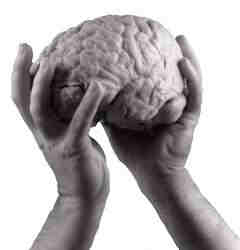Physiological Psychology
Physiological psychology focuses on the relationship between our biological makeup and our behaviour and experiences.
This area of psychology can be very convincing. For example we do know that the structure of our nervous system (including our brains) and the action of chemicals can have an effect on our behaviour. However, an important question is how much does our biology affect us?
Some physiological psychologists take a reductionist argument to answer the above question. That is, they argue that behaviour and experiences can be explained in terms of brain structure and chemicals. This reductionist argument has lead to such psychologists making great discoveries, for example, in the affect of drugs on mood and behaviour.
However, other psychologists (including many physiological psychologists) take the view that we cannot explain complex human behaviour and experience just in terms of brain structure and chemicals. There are other psychological variables which need to be considered, for example, such as how we act alone compared to how we behave in groups.
The study by Schachter and Singer (1962) investigates emotions and their two-factor theory argues that we experience emotions as an interaction between physiological and psychological variables.
Dement and Kleitman's (1957) study investigates what happens when we sleep and Sperry (1968) investigates the behaviour and experiences of people who have had their brains separated into two halves.
The study by Raine (1997) attempts to investigate the relationship between brain structure and function and violence.

Candidates
should;
·
Be able to
describe and evaluate the physiological approach in psychology;
·
Demonstrate an
understanding of attempts to explain emotional experience using both
physiological and alternative approaches;
·
Be able to
describe some of the findings that have arisen from research into
sleep states;
·
Be aware of the
basic structure and function of the nervous system;
· Be able to
evaluate the attempt to explain behaviour and experience in terms of
physiological changes;
·
Consider some of
the issues around the concept of localisation of function;
·
Consider some of
the ways that psychologists can investigate the functions of the
brain;
·
Consider the
implications of research in physiological psychology.
More Stuff
More pages.- Cognitive Psychology
- Developmental Psychology
- Individual Differences
- Physiological Psychology
- Social Psychology
And A Bit More Stuff
Some more pages.
- About (just stuff about this site)
- Core Studies 2 (a quick link to stuff about this paper)
- Exam Questions (past exam questions of course)
- Shop (you know you want to buy something)
- Links (nearly as fab as books)
- Further reading (books are fab)
- A Level Psychology (that stuff you do in the 2nd year)
- LearnByIt (where you can buy stuff that I have written)
- Learn Psychology (great site for any students of psychology)
Test yourself on the aims
here
Here is a great brain tutorial. The Hopes Brain Tutorial
Here is another smaller tutorial looking at the different functions of the lobes. Click here
And there is a great brain page here at the BBC
Below are the latest articles in the excellent BPS Research Digest.
